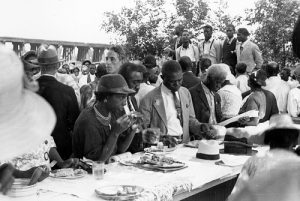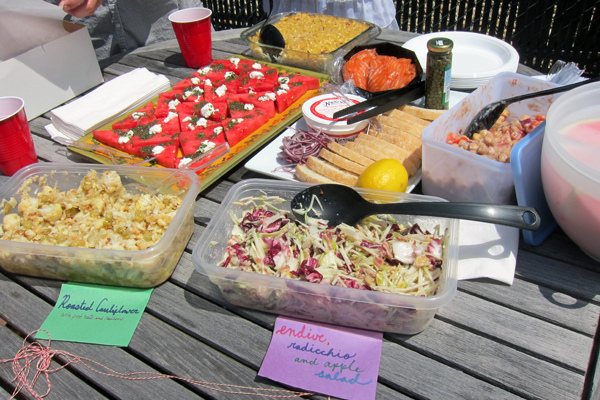Lectionary Reflection for the 11th Sunday after Pentecost, Year B
August 9, 2015
Jesus answered them, “Do not complain among yourselves. No one can come to me unless drawn by the Father who sent me, and I will raise that person up on the last day. John 6:43-44
Complain? Who, us? No way! In our congregation it’s all love and rainbows. Well, maybe that’s what we’d like to think or the story we want to tell, but the naked truth is that we have all sinned and fallen short of the God’s glory. And so we complain–occasionally. Well, perhaps more than occasionally.
Just like the first century religious folk who were following Jesus around, we tend to become caught up in the details. We have a predisposition towards control and knowledge (sort of like that newspaper check-out  line rag with the subhead “Inquiring minds want to know”). As a result there’s a real temptation to fall into fussing and fretting when we’d actually do better to focus on faith and feasting on the Bread of Life (aka Jesus).
line rag with the subhead “Inquiring minds want to know”). As a result there’s a real temptation to fall into fussing and fretting when we’d actually do better to focus on faith and feasting on the Bread of Life (aka Jesus).
The contemporary church is always on the lookout for new programs or plans for increased membership, budget enhancements, and reeling in families with children and youth. It is easy to see these things as solutions to all of our concerns and woes, when really we’d be much better off focusing our time and attention on the Lord, the author and giver of what meager faith we do muster up between our fears and our fusses.
Yes, that’s right. It may be time to take a divine “chill pill” and start feasting on the Bread of Life like there’s no tomorrow, or better yet, like there’s ALWAYS an eternal tomorrow. We can do precious little on our own. Everything we have, everything we are, indeed every breath we take is from God, pure gift and radical hope. We should, therefore, respond in gratitude by ordering our lives and days to align with God’s will and Jesus’ way. In doing so we are freed from an insistence to obsess over every minute detail and dilemma.
In this week’s gospel Jesus reminds the people following him that “No one can come to me unless drawn by the Father who sent me; and I will raise that person up on the last day” (John 6:44). This is God’s work and world; we are utterly dependent on divine provision, grace, and mercy–regardless of what we think or the rationalizations we accept. We are not in control. Nope. Not one little bit.
 What we can control (by the grace of God and the work of the Holy Spirit) is how we live in community and how we treat one another. In this week’s continuation of his letter to the Ephesian church, Paul makes it clear that being kind, tenderhearted, and forgiving are the expected marks of Christian behavior–not maliciousness, bitterness, anger, strife, and slander. We are to imitate God as experienced in Jesus and his love.
What we can control (by the grace of God and the work of the Holy Spirit) is how we live in community and how we treat one another. In this week’s continuation of his letter to the Ephesian church, Paul makes it clear that being kind, tenderhearted, and forgiving are the expected marks of Christian behavior–not maliciousness, bitterness, anger, strife, and slander. We are to imitate God as experienced in Jesus and his love.
This week, let’s encourage one another to relax, to practice love, and to feast on Jesus in Word and Sacrament. It’s called practicing discipleship, being formed in faith, and loving God with our whole being and our neighbor as ourselves. Come to the table. Come to the feast. Come to the party where all are welcomed, valued, and loved.
In Worship
This is the season of church picnics and family vacations. In your celebration of Holy Communion today make sure to help people see and understand the joy of the meal, the gifts God gives in strengthening, forgiving, and equipping us through bread and wine, water and word to walk another week in the world. Consider using the angel’s words to Elijah in this week’s Old Testament lesson as the invitation to communion: “Get up and eat, otherwise the journey will be too much for you.”
With Youth
Consider how Paul’s instructions to the Ephesians are equally instructive and helpful to us today. What does it mean to speak the truth to our neighbors, to not let the sun go down on anger, and to not give the devil space? Invite a conversation about each part of this short passage (Ephesians 4:25 — 5:2) and what it means to be an “imitator of Christ.”
With Children
Ask the children if they know about the game “Simon Says.” Most of them will likely be familiar with some version of the game. Play a couple of rounds with them. As part of “Simon Says” those who don’t follow the instructions are “out.” It’s a game of winners and losers, of those who are in and those who are out. Tell them there’s another game–a better game–where everyone can be a winner. “Jesus Says” gives us instructions for life. Give the children a very simple overview of the lesson from Ephesians with the instructions we have to be imitators of Jesus. Tell the children that we are invited to practice this game every day of our lives until we get it right. Jesus works with us, and we can help each other to do better. Finish with a simple prayer.
Photos: Just Cook NYC, Vic, Kheel Center at Cornell University, Creative Commons License)




Leave a Reply